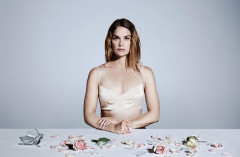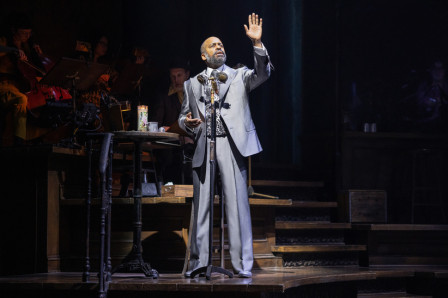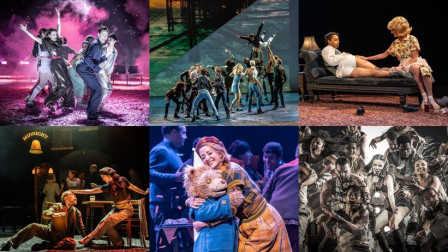Review: HEDDA GABLER at The National Theatre
 Henrik Ibsen’s HEDDA GABLER is one of those “sacred pieces” that not many directors dare to reimagine. The Belgian visionary Ivo van Hove who took UK’s theatre scene by storm in 2014 with his bold take on Arthur Miller’s classic A VIEW FROM THE BRIDGE is one of them. The pioneer of a method in which he challenges the parameters of the classics, now van Hove takes on to the National Theatre’s stage with Patrick Marber’s adaptation of HEDDA GABLER. Together with a great ensemble, led by the phenomenal Ruth Wilson, van Hove creates a trailblazing production, in which despite themodernisation, Ibsen’s heroine appears more visceral than ever.
Henrik Ibsen’s HEDDA GABLER is one of those “sacred pieces” that not many directors dare to reimagine. The Belgian visionary Ivo van Hove who took UK’s theatre scene by storm in 2014 with his bold take on Arthur Miller’s classic A VIEW FROM THE BRIDGE is one of them. The pioneer of a method in which he challenges the parameters of the classics, now van Hove takes on to the National Theatre’s stage with Patrick Marber’s adaptation of HEDDA GABLER. Together with a great ensemble, led by the phenomenal Ruth Wilson, van Hove creates a trailblazing production, in which despite themodernisation, Ibsen’s heroine appears more visceral than ever.
Newly married, Hedda Gabler (Ruth Wilson) struggles with the idea of spending the rest of her life with her academic husband, George Tesman (Kyle Soller). There is little she can do to entertain herself in their newly purchased apartment and the perspective of becoming friends with George’s aunt, Juliana (Kate Duchene) is as suffocating as the disturbing visits from Judge Brack (Rafe Spall). Everything changes with the arrival of Thea Elvsted (Sinnead Matthews), an old acquaintance of Hedda who brings news about Hedda’s love interest from the past Eillert Lovborg (Chukwudi Iwuji).
Ivo van Hove, like no other contemporary director, possesses a gift for making legendary and well known pieces sound and feel relevant to modern audiences. Jan Versweyveld's set is everything but a room full of antique cabinets and stifled ghosts of the past. This could be one of the new apartments in Canary Wharf; white and open spaces ready to be filled with minimalistic furniture. There are some incredible aesthetic and conceptual decisions, one of them being a glass cabinet filled with Hedda’s pistols, visible from the beginning of the piece, drawing the audience’s attention to an omnipresent sense of danger and tragedy. Joni Mitchell’s BLUE plays throughout, together with Jeff Buckley's version of HALLELUJAH, creating a sense of nostalgia and doomed dreams. The actors enter and exit the Lyttelton stage via the auditorium as if they were entering the public display of Hedda Gabler’s prison and van Hove keeps the maid Berte (Éva Magyar) on stage at all times making her a silent and hopeless witness to the tragedy and abuse that occurs.
Van Hove picks at the nuances and with conviction creates a world of its own without relying on archaic stereotypes or people’s expectations. Unlike in other productions where the titular character is usually misinterpreted and painted as a spoiltand unhappy woman, that perhaps doesn’t deserve her loving and sweet husband George, Van Hove’s Hedda is a multidimensional woman with many flaws, but one that still manages to evoke plenty of empathy. Ruth Wilson is absolutely mesmerising and there is a touch of depression about her Hedda as she sits at the piano, motionlessly hitting the keys. She is the Hedda so many have longed for: flawed, lonely, hurt, irrelevant and bored: a multidimensional character that exists moment to moment.
A reimagining of classical work at its best
The rest of the cast delivers outstanding performances throughout. Kyle Soller’s Tesman is a self-entitled and driven young man who views his new wife as a trophy, strongly forbidding her from playing with her pistols. Sinead Matthews as Mrs Elvsted, the antithesis of Hedda, creates a compelling character determined to follow her own path, yet conflicted as her purpose in life still heavily relies on men. Rafe Spall as the dangerous and malicious Judge Brack is the embodiment of misogyny itself as he paces around Hedda’s apartment in search for power and control.
What makes this production of HEDDA GABLER so devastating and revolutionary is how and why van Hove puts such an emphasis on the male characters of the play. I must challenge those reviewers who found van Hove’s production misogynistic as I found it quite the opposite. The tragedy of this Hedda is that she lives in a misogynistic world of suits, bravado and alpha-male wannabes. The intoxicating threat of violence and control that Hedda faces between the four walls of her gigantic and cold apartment, mirrors that of a contemporary world in which women are still met with abuse and discrimination from men, regardless of their background or status. The shattering final scene between Hedda and Brack is not about punishing the heroine but about highlighting the presence of male dominance in the contemporary world. This is a reimagining of classical work at its best and what comes with it is the risk of allowing people to form their own fresh interpretations, which sadly very often results in people rejecting this kind of work all together.
HEDDA GABLER at the National Theatre is an unforgettable production
Ivo van Hove’s HEDDA GABLER at the National Theatre is an unforgettable production that will hopefully be seen by many young theatre makers inspiring them to create bold and radical work and changing the way so many perceive Ibsen’s work.
Latest News

 New musicals to watch in London in 2026
28 December 2025 at 11:24
New musicals to watch in London in 2026
28 December 2025 at 11:24

 New plays to watch in London in 2026
28 December 2025 at 09:24
New plays to watch in London in 2026
28 December 2025 at 09:24

 Daniel Breaker joins West End production of Hadestown
26 December 2025 at 21:46
Daniel Breaker joins West End production of Hadestown
26 December 2025 at 21:46

 London Productions 2025 - A Year in Review
26 December 2025 at 21:11
London Productions 2025 - A Year in Review
26 December 2025 at 21:11
